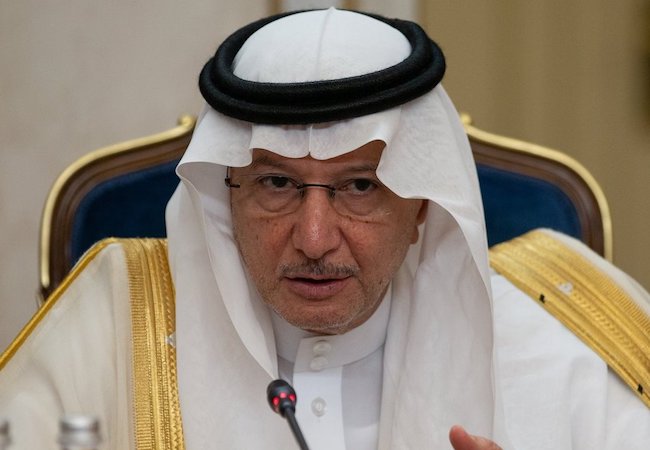Muslim grouping OIC urges support for vulnerable states in corona battle

The Organization of Islamic Cooperation (OIC) urged member states on Wednesday to help struggling OIC member states combat the coronavirus pandemic, particularly in Africa. The 57-member group’s executive committee, after a virtual meeting, also called on member countries to help bridge a shortfall in essential medical supplies, particularly testing devices and protective equipment.
“No country alone can deal with the damage and multiple challenges presented by the novel coronavirus,” said a statement released by the Jeddah-based OIC on Wednesday. “We call on all member countries and organizations to show their solidarity with African member states,” said the statement, while referring to the acute shortfall of medical supplies in those countries.
The virtual meeting was presided over by Prince Faisal bin Farhan Al Saud, Foreign Minister of Saudi Arabia, the Chair of the 14th Islamic Summit, with the participation of the Secretary-General of the Organization of Islamic Cooperation (OIC), Dr Yousef Al-Othaimeen. Opening the meeting, the Saudi Foreign Minister gave a brief account of his country’s support to the world in response to the pandemic. He pointed out that the Kingdom donated $500 million in financial support to relevant international organizations, in addition to $10 million to the World Health Organization (WHO), $38 million in health aid to Yemen, and $3,010,000 to the State of Palestine.
Prince Faisal added that Saudi Arabia donated $9M to the Islamic Solidarity Fund (divided in three equal parts over three years). For his part, the OIC Secretary General Dr Al-Othaimeen said the whole world is in the same boat in the fight against COVID-19; a pandemic with far-reaching implications on a national, regional and global scale. The situation is such, he stressed, that it requires more than ever today of the member states to join forces, enhance their Islamic-driven solidarity, cooperation and coordination to stem the spread of the virus.
The foreign ministers, members of the Executive Committee, all stressed the need to tackle the virus and its implications for health, humanitarian, social and economic systems. As well as calling for global COVID-19 response efforts to continue in a spirit of solidarity, drawing on scientific research and large-scale coordination, they underlined the importance to scale up national preparedness and response measures of prevention and alleviation of the devastating effects of the pandemic.
The OIC also echoed a UN call for a ceasefire in conflict areas to allow delivery of aid, specifically mentioning war-ravaged Yemen, which has so far reported only one case of the virus but where a five-year war has shattered the health system and left millions vulnerable to disease. “No country alone can deal with the damage and multiple challenges presented by the novel coronavirus,” said the statement.
Bangladesh, an OIC member state, said that the OIC member states require a regional and global response based on unity, solidarity and compassion to overcome the challenges of coronavirus pandemic. “Intensified global and regional cooperation is needed not only to contain, mitigate and defeat the pandemic but also to overcome the economic hurdles left by this crisis,” said Bangladesh Foreign Minister Dr AK Abdul Momen, who attended the virtual meeting.
Dr Momen made the remarks while delivering his statement at the videoconference of the OIC Executive Committee at the level of Foreign Ministers on the consequences of COVID-19 pandemic and joint response. Taking note of the vulnerability of migrant workers across the globe, particularly in the Middle East and other OIC member states, Dr Momen urged the members “to give utmost importance to the issue of job retention of domestic and resident migrant workers, especially Muslim migrant workers, so that sudden shock of unemployment can be cushioned off and the social balance can be preserved.”
He said a voluntary “COVID-19 Response and Recovery Fund” may be created by the willing OIC member countries, independent of the efforts put in place by the Islamic Development Bank (IsDB) and Islamic Solidary Fund (ISF). In the future, Dr Momen said, long-term assistance would be needed to revive the economic devastation caused by COVID 19.
“In this regard, I thank the IsDB for laying out $ 2.3 billion funding for Strategic Preparedness and Response Program for COVID-19 pandemic. We hope, IsDB would allow softer terms for such loans, particularly for LDCs,” Dr Momen said. He said more developed Member States of the OIC may assist the LDCs and other developing OIC member states by supplying medical equipment and supplies in treating the COVID-19 patients.
He said steady distribution of food and essential commodities amongst the most vulnerable groups, irrespective of their residency status, are of utmost importance now to protect lives. “If the lockdown situation prolongs, starvation is imminent in many of the OIC Member States, including amongst the migrant workers who are under threat of losing their jobs and salaries,” he said.
Dr Momen said charity and philanthropic organizations in OIC Member States may be encouraged to extend assistances in countries and communities in need. He said IsDB can actively consider deferral and cancellation of loan payments of the OIC borrowing countries especially from the LDCs.
He said that a voluntary “COVID-19 Response and Recovery Fund” may be created by the willing OIC Member Countries, independent of the efforts put in place by the IsDB and ISF. He said suitable projects may be submitted, particularly by LDCs in collaboration with charities/foundations, to seek assistance from the special account created under the ISF to help the vulnerable groups, including migrant workers – if they are not covered under the safety net program of the host governments.
He said Prime Minister Sheikh Hasina has already announced the largest ever financial and social safety assistance package in Bangladesh’s history covering our industrial workers, agriculture sector as well as frontlines key workers including doctors, nurses, health professionals, law enforcement and field-level people who are risking their lives to fight the coronavirus pandemic.
“This is not only for maintaining our own macroeconomic stability – but also that the global supply chain does not break down.” In the wake of novel coronavirus that has hit about 200 countries around the world, Pakistan has been ranked as the fourth most affected country among members of the Organization of Islamic Cooperation.
In a statement on Twitter on Tuesday, OIC raised concerns over the swelling numbers of coronavirus cases in member states despite tremendous efforts by the countries to contain the virus — that has claimed over thousands of lives so far. Iran tops the list as the worst calamity-hit country with over 62,000 reported cases along with nearly 4,000 deaths to date. Following Iran are Turkey and Malaysia with 649 and 63 fatalities respectively.
Pakistan is listed fourth with over 4,000 reported cases, 55 deaths and at least 429 patients recovered. The number of cases has seen a rapid surge despite the country being under lockdown for the third consecutive week. OIC has 57 member countries with a total population of nearly 1.85 billion people. This makes it the second-largest intergovernmental organization after the United Nations (UN). Its mission is to safeguard the interests of Muslims. It supports Muslim peoples’ struggles in different parts of the world including Palestine, Syria, Jammu & Kashmir and other areas across the world.




